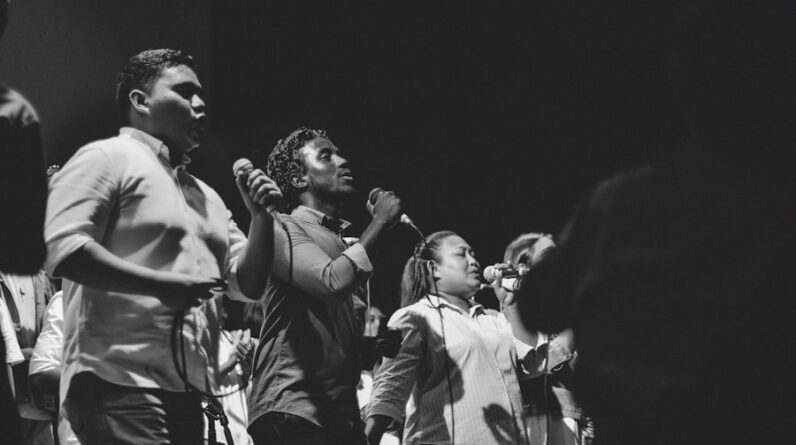
Stage fright, often referred to as performance anxiety, is a common experience that many singers face. It manifests as a feeling of nervousness or fear before or during a performance, and it can significantly impact your ability to deliver a confident and engaging show. You may find yourself grappling with a racing heart, sweaty palms, or even a shaky voice as you step onto the stage.
Understanding that these feelings are normal can be the first step in overcoming them. Recognizing that even seasoned performers experience stage fright can help you feel less isolated in your struggle. The effects of stage fright can vary from person to person.
For some, it may lead to a temporary loss of vocal control or an inability to remember lyrics. For others, it might result in a complete shutdown, where the thought of performing becomes overwhelming. This anxiety can stem from various sources, including fear of judgment, perfectionism, or past negative experiences.
By acknowledging these feelings and understanding their origins, you can begin to develop strategies to manage them effectively.
Key Takeaways
- Stage fright is a common feeling of nervousness and anxiety that affects singers before and during a performance.
- Mental and emotional preparation is key to overcoming stage fright and includes techniques such as positive visualization and deep breathing exercises.
- Physical preparation, including relaxation techniques and confident body language, can help singers feel more at ease on stage.
- Vocal warm-ups and exercises can help build confidence and prepare the voice for a performance, reducing the impact of stage fright.
- Visualizing success and using mental imagery can help singers overcome stage fright by creating a positive and confident mindset.
Preparing Mentally and Emotionally for a Performance
Mental and emotional preparation is crucial for overcoming stage fright. Before stepping onto the stage, take time to center yourself and focus on your intentions for the performance. You might find it helpful to engage in mindfulness practices, such as deep breathing or meditation, to calm your mind and body.
By grounding yourself in the present moment, you can reduce anxiety and foster a sense of clarity. Visualizing your performance as a positive experience can also help shift your mindset from one of fear to one of excitement. Additionally, consider setting realistic expectations for yourself.
Understand that perfection is not the goal; rather, it’s about sharing your passion for music with your audience. Embrace the idea that mistakes are a natural part of performing and that they do not define your worth as an artist. By reframing your thoughts and focusing on the joy of singing, you can cultivate a more positive emotional state that will enhance your performance.
Physical Preparation: Techniques for Relaxation and Confidence

Physical preparation plays a vital role in managing stage fright. Engaging in relaxation techniques can help ease tension in your body and promote a sense of confidence. Stretching exercises can be particularly beneficial; they not only release physical tension but also help you become more aware of your body.
Consider incorporating gentle neck rolls, shoulder shrugs, and deep lunges into your pre-performance routine to loosen up. Another effective technique is progressive muscle relaxation. This involves systematically tensing and then relaxing different muscle groups in your body.
By doing this, you can become more attuned to areas of tension and learn how to release them consciously. As you practice these techniques regularly, you’ll likely find that they become second nature, allowing you to approach performances with greater ease and confidence.
Vocal Warm-ups and Exercises for Stage Confidence
Warming up your voice is essential not only for vocal health but also for building confidence before a performance. Engaging in vocal exercises helps prepare your vocal cords for the demands of singing and can alleviate some of the anxiety associated with performing. Start with gentle humming or lip trills to warm up your vocal cords without straining them.
Gradually progress to scales and arpeggios, focusing on smooth transitions between notes. Incorporating breath control exercises into your warm-up routine can also enhance your confidence. Practicing diaphragmatic breathing allows you to support your voice more effectively while reducing tension.
As you become more comfortable with these exercises, you’ll likely notice an increase in your vocal stamina and control, which can translate into greater self-assurance on stage.
Visualizing Success: Using Mental Imagery to Overcome Stage Fright
Visualization is a powerful tool that can help you overcome stage fright by creating a mental blueprint for success. Before your performance, take a few moments to close your eyes and imagine yourself on stage, delivering a flawless performance. Picture the audience responding positively—smiling, clapping, and enjoying your music.
This mental imagery can help reinforce a sense of confidence and ease any lingering anxiety. To make visualization even more effective, try to engage all your senses during this exercise. Imagine the sound of your voice filling the venue, the feeling of the microphone in your hand, and even the sight of the audience’s faces illuminated by stage lights.
By immersing yourself in this positive mental experience, you can create a sense of familiarity with the performance environment, making it feel less intimidating when the time comes to actually step on stage.
Dealing with Mistakes and Setbacks During a Performance

Even with thorough preparation, mistakes can happen during a performance. It’s essential to develop strategies for dealing with these moments gracefully. First and foremost, remind yourself that mistakes are part of being human; they happen to everyone, regardless of experience level.
Instead of dwelling on what went wrong, focus on how you can recover and continue with confidence. One effective approach is to practice mindfulness during performances. If you make an error, take a deep breath and acknowledge it without judgment.
Shift your focus back to the music and the emotions you want to convey rather than fixating on the mistake itself. This shift in perspective allows you to maintain your connection with the audience and continue delivering an engaging performance despite any setbacks.
Seeking Support: Utilizing a Support System to Overcome Stage Fright
Having a support system in place can be invaluable when it comes to overcoming stage fright. Surrounding yourself with encouraging friends, family members, or fellow musicians can provide you with the reassurance you need before stepping onto the stage. Share your feelings of anxiety with them; often, just talking about your fears can help alleviate some of the pressure you feel.
Consider inviting someone from your support system to attend your performances or rehearsals. Their presence can serve as a comforting reminder that you are not alone in this journey. Additionally, seeking feedback from trusted individuals after performances can help you gain perspective on what went well and what areas you might want to improve upon in the future.
Post-Performance Reflection and Growth: Learning from Each Experience
After each performance, take time to reflect on your experience. Consider what went well and what challenges you faced during the show. This reflection process is crucial for growth as an artist; it allows you to identify patterns in your performance anxiety and develop strategies for improvement over time.
Journaling about your experiences can be particularly helpful in tracking your progress and recognizing how far you’ve come. Embrace each performance as an opportunity for growth rather than a final judgment on your abilities as a singer. Celebrate your successes, no matter how small they may seem, and use any setbacks as learning experiences that contribute to your development as an artist.
By adopting this mindset, you’ll find that each performance becomes less daunting and more rewarding as you continue to evolve in your craft. In conclusion, overcoming stage fright is a journey that requires mental preparation, physical readiness, and emotional resilience. By understanding what stage fright is and how it affects you as a singer, preparing mentally and physically for performances, utilizing visualization techniques, and seeking support from others, you can build confidence over time.
Remember that mistakes are part of the process; learning from each experience will ultimately lead to growth as an artist. Embrace every opportunity to perform as a chance to share your passion for music with others while continuing to develop your skills along the way.





